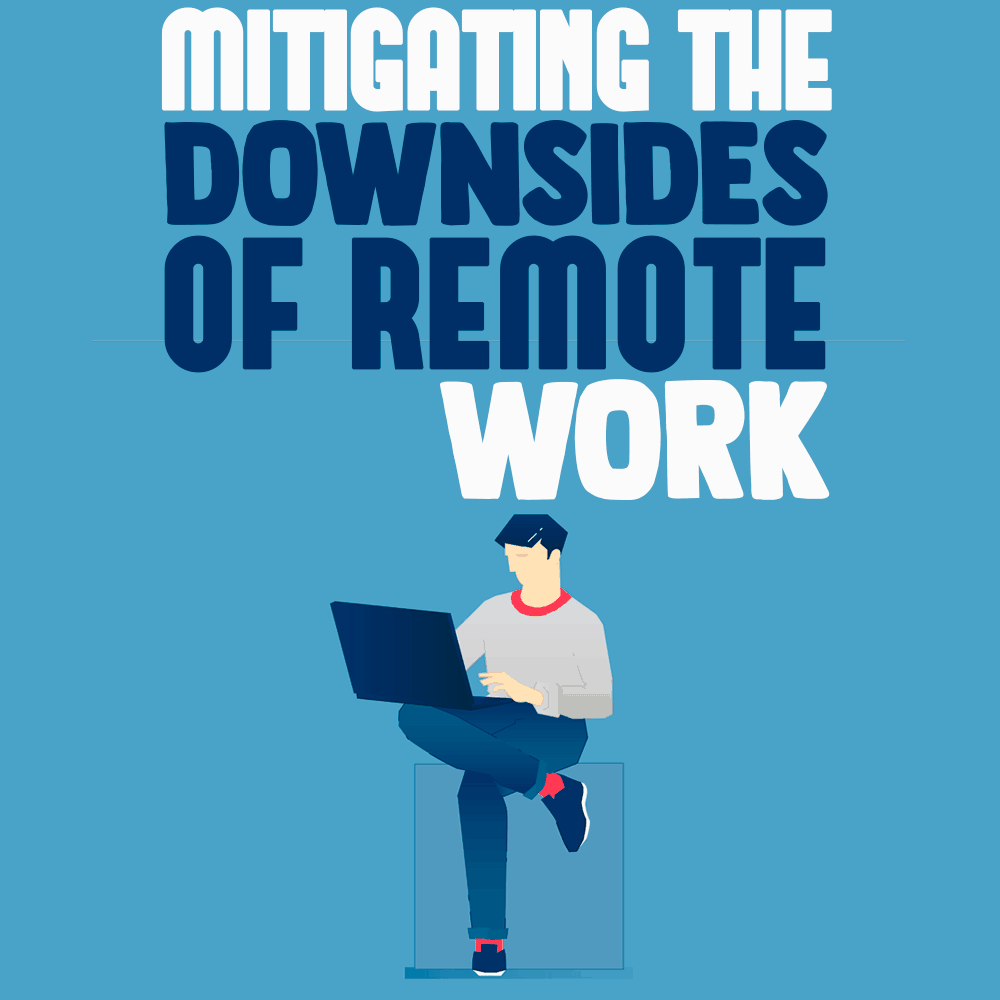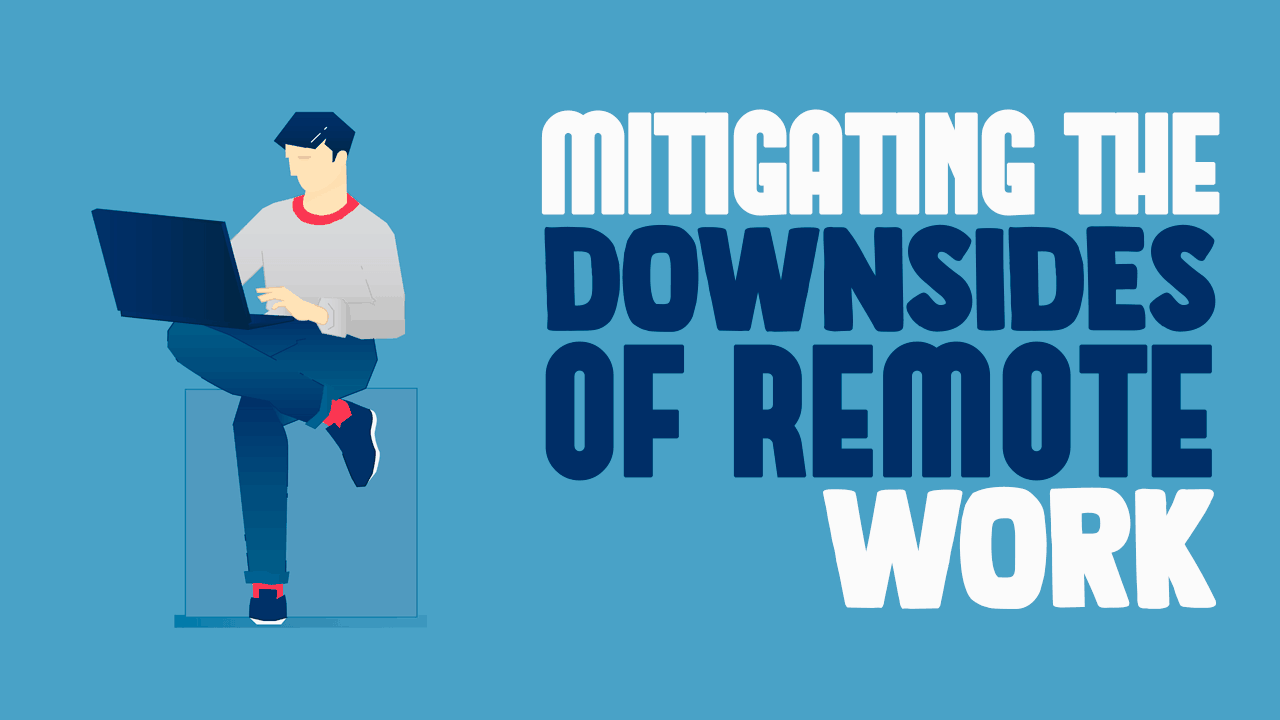This is a chapter from the upcoming book “Remote Work – The Complete Guide” which we will be publishing first on Simple Programmer. You can get the book for an EXCLUSIVE MEMBERS DISCOUNT, [thrive_2step id=’34089′]just click here[/thrive_2step].

Everything in life is a trade-off. While there are loads of benefits to being able to work remotely, it’s no panacea: You need to understand from the outset what you are giving up by not going into an office.
For instance, if you were previously relying on your co-workers to provide you with a semblance of a social life, working remotely may drastically change that for the worse. If you previously enjoyed being able to walk away from a bad job and start a new one quickly, you may be surprised to learn how much more difficult it is to get a fully remote job.
Further, it takes additional effort for your boss to recognize your contributions to the team, which can translate into lower pay, fewer promotions, and a higher risk of being downsized.
You may find that your active and continuing input on projects is more difficult, leading you to be treated like a second-class citizen, especially if the rest of the company goes into the office to work. This can be because it’s harder for you to be involved in the necessary meetings. You can also find that you are perceived as not being involved. Both of these things are problems that might cause you to be forced into the office if there is a change in management.
Overcoming the downsides of working remotely is not the responsibility of your boss, co-workers, spouse, or social circle. It’s great if they help, but you shouldn’t rely on them to help you overcome the downsides of your choice to work remotely. It is largely your decision, and it’s up to you to make sure that you and those around you don’t regret it.
You do have some advantages when working from home. For one, your day probably has fewer random interruptions by co-workers. For another, you aren’t wasting an hour or more commuting to and from the office. You also probably have more money available, assuming that you didn’t take a pay cut for the opportunity to work remotely.
While you almost certainly want to use the increased time, money, and ability to focus on things other than work, you should spend at least some of your spare time making sure that working remotely remains sustainable for you.
This whole process is very similar to how many of us felt when we first started living away from our parents. Previously, the environment sort of “took care of you,” whereas once you got out in the real world, you had to handle things yourself.
While transitioning to living alone offers freedom, very few people get out on their own without running into at least a few problems. For example, the freedom to sleep in can lead to the consequence of being late for work. Personal freedom requires maintenance.
It’s exactly the same with remote work: You don’t want to do the career equivalent of wearing dirty gym clothes to finals because you didn’t plan ahead. In this post, we’ll take a look at all the downsides of working remotely, and I’ll offer you some concrete tips that will help you mitigate them.
Social Isolation
One of the most serious problems in remote working environments is the possibility of being extremely socially isolated. While you might have family or roommates living with you, if you don’t take active steps to have some social interaction, you may end up feeling isolated, especially over months or years.
While there is wide variation in the amount of interaction that people require, almost everyone needs at least a little.
If you truly believe that you don’t need any other human interaction other than what you get remotely from your co-workers, that’s OK. Think instead in terms of your long term career: You need interaction just to maintain your personal network, even if you would otherwise prefer to be a hermit on a deserted island somewhere.
I used to think that I didn’t need much interpersonal interaction. However, eventually I learned that—while I don’t need much—I do need at least a little to be normal and well-adjusted.
In my case, I had been working at a job that was completely remote for a few months, and I thought things were going well. However, looking back, I was clearly exhibiting symptoms that might well be considered indications of depression. I had disrupted sleep, was constantly negative, and was overly fixated on whatever the next task was for work, even on weekends.
Additionally, I was losing weight from failing to eat, and I was requiring more and more caffeine to feel normal enough to be productive. As my coffee intake started increasing to more than six cups by lunch, one of my co-workers mentioned that he was getting a little stir-crazy in his house as well.
We ended up doing a Google Hangouts video session for a couple of hours a day. That lightweight simulation of being in an office with co-workers really helped both of us to get back to a more normal state of focus.
Those two hours a day ended up being some of the most productive development hours I’ve ever experienced, as we could collaborate and quickly solve small problems, relegating the larger problems for more focused time after we ended the call.
The impact of isolation seems to play out differently for different people. For some developers I’ve known, it seems to help them focus, but over a longer time period, they end up disconnected from their team and their team’s goals. This can lead to being clueless and out of touch if you let it go on for long enough.
I’ve known other developers who handled their sense of isolation by spending an excessive amount of time talking in meetings while others got even quieter. I’ve even worked with a few who developed substance abuse problems due to a combination of overwork and isolation, including one who died as a result.
Chronic isolation can often seem tempting, especially if you are stuck in a dysfunctional office environment with constant interruptions. However, as with most things, moderation is the key. If you really want to be able to work remotely over a longer period of time, it’s important to cultivate and maintain relationships outside of work.

While you might think that simply talking to your family is enough, it’s usually worthwhile to seek friends and activities outside of the house, as you probably only get a few kinds of interaction from family.
Since you probably need at least some human interaction to be mentally healthy, before you start trying to work remotely more than a couple of days a week, you need to start finding activities that you can do outside of the house. While everyone’s preferences are different, here are a few ideas to get you started.
Sports activities are always a good idea. It can be anything from weightlifting and running marathons to various team sports such as soccer, airsoft, or basketball; anything that can not only help you maintain an interpersonal network but also improve your physical health and mood as well.
Personally, I lift weights. I find that it helps my mood considerably and reduces soreness from long periods of working at a keyboard.
Intellectual activities such as learning another language, taking classes in interesting subjects, or even participating in book clubs can satisfy your intellectual curiosity and give you something to talk about other than work. I chose to learn a foreign language (Russian) for this.
With performance activities such as public speaking, dance, and learning to play instruments, you can satisfy your creative drive while giving yourself a non-work-related challenge. Public speaking has occupied this role for me.
Religious activities can also give you a ready-made community of similar people. I don’t exactly have this anymore, but I do have a pretty strong and supportive social network of other entrepreneurs and entrepreneurial developers who are a tremendous source of inspiration and support.
You can also just have a group of friends who get together on a regular basis to hang out, but sometimes that’s a bit more difficult as people get older and have children. I’ve found that a lot of my friendships have changed over the years, as happens to most people after 30. I like to get together with my friends when I can, but I don’t rely on it.
There are a ton of options for other activities outside the house that will help reduce your sense of isolation. It’s important to find something that looks interesting to you and try it out a bit before you get started with an ambitious remote work schedule so that you are prepared to make it into a habit once you really go remote.
The first few weeks or so after starting a new routine is the best time to ingrain new habits that you would like to keep, so you’ll want to make sure that you have an activity lined up.
There is another reason why you should try a few options for social interaction before going remote: If you find something you really like, it can end up being what helps motivate you to stick with it.
Remote work isn’t necessarily easier than working in an office, and having something that helps to motivate you can get you through the tough spots. More than once, knowing that going back into the office would severely cut into my study time for Russian kept me going when a lot of other motivation was gone.
Getting Stuck in a Bad Job
Another problem that many people don’t consider when they start working remotely is that it can trap you in a bad job. Previously, we discussed the enormous cost and time savings that can accrue when you start working remotely. However, these advantages can work out to be a bit of a double-edged sword, especially if you start making decisions based on having extra time and money.
For example, let’s say that working remotely saves you 10 hours a week and $500 a month (it should do better than that, but round numbers make calculations easier).
If you buy a new car that has a $450 a month car payment and commit to taking a college class that takes 10 hours a week when you are already close to the edge in money and time, then a potential job loss or even being forced back into the office puts those things in peril.
Such a situation increases your employer’s leverage over you to a degree that you perhaps have to put up with things that you shouldn’t simply to avoid having your entire life thrown into chaos while you find something else.
When you suddenly find yourself with more money or time, don’t default to spending it. Only spend either money or time when you know you have enough surplus to still be intact if things go poorly.
In the previous example, if you have $2,000 a month coming in that you aren’t spending, then a $500 car payment isn’t the end of the world. It’s probably not a good investment, but it doesn’t stretch you into a situation of further risk. Similarly, if the extra 10 hours a week is in addition to 20 more hours of largely unallocated free time, spending 10 isn’t the end of the world.
When your pay (or free time) increases, it’s easy to react by spending them. Instead, you’ll find that you can greatly increase your personal freedom if you invest those gains in ways that can eventually create additional free time and income for you.
For example, when I started working remotely, I spent money on training so I could more efficiently use the tools I needed to write my first book (and this one). Similarly, I used the extra time to write the books.
This investment produced income and opportunities that made it easier to be a lot pickier than usual in regard to my next job. The ability to be relaxed about the job search allowed me to wait for something that better fit my needs, giving me higher pay and more free time than I might have otherwise had.
In addition to avoiding lifestyle inflation when working remotely, I strongly suggest a bit of lifestyle deflation instead. For instance, you can probably save a ton of money by only going out to eat when you really feel like it and then eating the rest of your meals at home.

Further, a lot of the purchases you might have been making so that you could cope with office life (beer after work, for instance) can often be reduced or eliminated entirely.
Since switching back to working remotely, I went from going out to eat almost every day for lunch to doing so maybe twice a week and at cheaper restaurants. I notice no difference in my happiness, and every penny I save is more time to find something else if my job goes away.
When working remotely, you should also be paying attention to what is going on in the office. You don’t want to get surprised by suddenly being downsized or forced to come in.
If you have a sense that something negative is going on, you may want to go ahead and send your resume out. It takes a lot longer to find a good remote job than it does to find one that is on-site due to the smaller pool of potential employers, so you should be quicker to send out your resume than you might be otherwise.
Getting Forced Back Into the Office
It’s not nice, but it can occur: You could suddenly be forced back into the office. A lot of managers don’t like the idea of remote work at all, and new managers can sometimes implement sweeping rule changes.
Additionally, the company may have problems with some of its remote workers and decide to penalize everyone. Finally, you’ll occasionally get clueless managers who want to drag everyone into the office for “synergy” and “collaboration” or who suddenly want you to “earn” your ability to work remotely (long after you “earned it”).
I’m going to give a rather radical suggestion here that a lot of people won’t like: When this happens, send your resume out immediately and be unwilling to accept a counteroffer.
Many people are tolerant of lower salaries, worse benefits, or even longer working hours simply to be able to work from their house, and they negotiated (or tolerated) their current situation in good faith that it would continue.
However, forcing everyone to come back into the office demonstrates two things: It shows that you can’t trust any deal that the company makes with you and that management is callous about breaking such deals.
As a result, even if you personally are otherwise happy with the job, the company is apt to start shedding employees as remote workers with options leave. You may have to go into the office for a little while as you line up the next job, but you should get out as quickly as is reasonable if this happens.
Additionally, as I previously explained, you should be really careful about lifestyle inflation, especially in terms of time or money. In either case, being accustomed to having more means that management has leverage over you in a way that is really unhelpful.
If you are instead building up your savings or building assets that produce money, you’ll have time to wait while you line up better options. Make sure that your plan to work remotely is resilient to changes in management or it will always be at risk. Make sure that you are in a position where a change is an opportunity, not something that you have to fear.
Missed Promotions and Lower Pay
In addition to the other possible negative outcomes of working remotely, there is also the risk that you will be passed up for promotions and pay raises.
To understand why this occurs, let’s examine a couple of ways I’ve heard it expressed from a management perspective. Here are some viewpoints that your manager may have. It’s important to understand these so that you can counter them.
“They work from home, so they are already saving money.” This is absolutely true and utterly irrelevant as well. The other companies out there are paying increasing salaries, including to their remote workers. Nevertheless, this attitude persists. Rather than having this argument with management, you need to be able to point to the value that you provide to the company. This requires clear examples and documentation.
“Why should I pay them more when I can hardly tell if they are working?” This points to a common problem for remote workers. A lack of communication in the office can result in management constantly coming by your desk for status updates, while a lack of communication while remote can cost you your job or seriously hamstring you at review time.
With both of these objections, you’ll notice that communication is of huge importance if you want to better your career in general and is even more important if you want to maintain it at all while remote.
While lots of books suggest that you simply “communicate better,” that advice is not particularly helpful if you aren’t a great communicator already. Instead of giving you rules about things like the length of emails and writing style, it’s often better to have a few simple rules governing communication.
While at first you might not believe that a few simple rules can change the way your manager and your team perceive you, you need to remember that team communication is a complex, interdependent system.
In such a system, a few simple rules change the state of the entire system by changing the way the components interact. For inspiration, let’s use an example from the natural world before diving into a set of rules that can help you.
Have you ever watched a school of fish move? While the patterns may be complex, the individual animals’ behaviors are not, simply obeying a set of four very simple rules. Those rules are:
- Get away from anything that appears threatening.
- Maintain a minimum distance from everything else.
- Match the speed of the rest of the group.
- Move toward the perceived center of mass of the group.
That set of four really simple rules produces the complex schooling and shoaling patterns that you see when you watch “Shark Week.” There is no leader of the school, only the interaction of simple rules.

In other words, fixing your communication is not going to require a huge investment from you, nor is it going to require you to change who you are by suddenly talking excessively to people (if you don’t like doing so) or even pretending to be an extrovert. Rather, it requires the conversational equivalent of being a fish. Four simple rules will get you there:
- Communicate problems early rather than waiting until they become too severe to deal with.
- Communicate asynchronously and concisely so that you aren’t a problem for the rest of the group.
- Make sure that you communicate things to others before they need them (but not too early) so that you aren’t blocking them.
- Communicate status at predictable times.
While the above won’t make you a perfect communicator, it can greatly improve the way that your communication is seen.
Simply put, communicating while following these rules does two things. First, it makes sure people have the information they need when it is useful to them, and second, it keeps people from wondering what’s going on.
The latter is especially important for remote workers, as people tend to try to infer information when they don’t have it. That inference has a chance to backfire on you, so it is important to control it so that it doesn’t occur when people are already stressed out.
Giving people information before they ask for it has another advantage. If done well, other people will start to respond to the behavior, usually by not interrupting you to ask for things. After all, it’s less effort for them, and they still get good results.
While being influential on your team in this way may not net you any pay raises or promotions directly, it may help reduce the sort of team dynamics that can keep these things from happening. A team that is less efficient due to interruptions and other information flow problems is less likely to get a raise and more likely to run into performance issues that get the attention of management.
For instance, if a manager with an interruptive management style learns that you always send in a quick note at 9 in the morning, they are less likely to bug you for a status update at 8:55. In other words, your communication style should be adjusted to assume that people in general follow a few simple rules, one of which is avoiding the expenditure of effort when it isn’t required. It’s so easy that even an albacore could do it.
Here’s what this might look like for a remote software developer who reports to a project manager and other stakeholders in addition to communicating with their team. Note how the following practices achieve the objectives previously listed, and then take the bare minimum that might work for you and test it out. You’ll find that outsized improvements are a lot easier to achieve than you might expect.
Every day, send a written status report to your project manager that tells them what you did yesterday, what you plan to do today, what is blocking you, and what meetings you may have scheduled. This is in addition to your scrum meeting if you have one, but should cover the same material.
When something new blocks you, allocate a short period of time to try and get past it, and then raise the issue by email to the person on your team most likely to be able to help you. Copy the project manager on the email so they know what is going on.
Don’t expect a reply immediately, and work on smaller, simpler tasks in the meantime. This means that you should have a set of small, less critical tasks in mind to choose from.
Let your team know when you start work for the day, when you head out to lunch, when you return, and when you are done for the day. Hopefully you have a chat system for the team (and hopefully it allows the muting of notifications).
If other team members need something from you (or are delivering something you need from them), letting them know when you are working allows them to quickly determine whether you are available without having to guess. Setting expectations this way also helps keep other people from abusing your time and attention.
Good communication does two more things for you. First, it ensures that you are clearly communicating your value to the team. Nobody (including your manager) has to guess what you are doing.
Secondly, when the time comes for an annual review or a possible promotion, it provides a thorough paper trail for the management (doubly so if you give these emails the same subject line and never delete your sent items).
Rather than saying “I worked 60 hours a week all year!” you can point to what you actually got done. The latter is more easily tied to the value you provided and doesn’t sound whiny. This allows you to approach salary and promotion discussions from a position of strength, and it does so while removing some of the issues that can make raises and promotions harder to achieve.
Becoming a Second-Class Citizen
One common concern for those getting into remote work is the possibility that they will begin to be treated differently at work. Whether it’s because they aren’t involved in important, but informal conversations, or simply because they can’t talk the boss on a regular basis, many would-be remote workers are rightly concerned about the quality of their work relationships as a result of going remote.
This concern is reasonable, especially if you are in a hybrid situation where most people work in the office while you work from home. I can also tell you from bitter personal experience that this is an extremely common problem for remote workers, having been on the receiving end of it more than once.
There are three main ways that remote workers may be treated as second-class citizens by their employers. Most of the time, these are unintentional, although it certainly won’t feel unintentional when it’s happening to you.

The first way that you might be sidelined is by not being privy to informal conversations that happen in the office. The second is by not having your time and boundaries respected. The third occurs when you are blamed for problems in which you had no part, simply because you aren’t able to defend yourself.
We’ll break down each of these things so that you can proactively mitigate them.
Missing Out On Informal Conversations
Probably the worst thing about working remotely is missing all the useful conversations that happen in the office (conversely, the best thing about being remote is missing the other kind).
Whether it is finding out that someone got fired or that the company landed a new client or finding out about specific details of project implementation, informal conversations seem to be the lifeblood of most offices. The consequences of missing out on some of this information can be stark.
For instance, if you don’t know that a co-worker was fired or quit, you may waste a lot of time waiting on them to respond to an email when you have a tight deadline looming. Even worse, you might find that suddenly their projects have landed on you or worse still, that management is in a bad mood and will not appreciate the email you are about to send.
I’ve worked at a lot of companies that had at least one manager who was the topic of frequent conversation, usually because of their emotional volatility. You don’t want to find out the hard way that such a person is having a bad day.
Office communication styles vary a lot. While many offices use the best tools they can find and try to keep good documentation on every decision they’ve made and why, you’ll also find offices that are stuck in the stone age as far as their internal processes.
In the latter case, almost no decisions are documented, and everyone relies on their own memory when attempting to recall why a decision was made (or even what decision was made). The results are often terrible even if everyone is on-site. But it’s even worse if you aren’t on-site and are held accountable for your adherence to these decisions when you weren’t even in the conversation.
What’s even more annoying is that even in a modern office that documents things well, hallway conversations and implicit assumptions are still easy to miss.
To compound the problem further, most people can remember what they were told and who told it to them, but usually can’t recall who else was in the conversation. This is especially true when the topics are trivial or when some time has passed since the conversation. As a result, your co-workers may legitimately be completely unaware that you don’t have a piece of critical information.
Thankfully, like the previous discussion on missed promotions and lower pay, a couple of simple rules can help. However, these rules are much more difficult to implement and require a lot more discipline than the rules of communication outlined earlier.
First, you need to make sure that you ask questions early and often. This applies even when you think you know the answer to the question. The idea here is to get people to explicitly state what they want in written form.
For instance, let’s say that you work for a company that does data entry forms for a particular industry. You might ask “Are they going to use this on mobile?” “Will this ever be used in an occasionally connected environment?” and “Will there be a publicly exposed API for this stuff?” even if the answer to these questions is typically “no.”
The reason you ask isn’t necessarily to get information but to have a warning if any of your assumptions are no longer valid. Further, if you are asked to write specifications or report on progress, try to do so in a way that forces your own assumptions to be tested against reality.
Remember that your assumptions are dangerous, especially if you don’t have frequent face-to-face and informal conversations with your co-workers.
Second, you need to make sure that any work products you produce are examined by someone whose assumptions are more likely to be correct. For software developers, this tends to mean code reviews. You want to do these as often as you can without harming the productivity of the team, and start doing them as early as possible.
This check on your assumptions can make any mistakes cheaper and also gets more people involved in checking your assumptions. For instance, if you go over the code with a more senior developer who is still in the office, when they hear something contrary to the way you have written your code, you are more likely to find out about it sooner.
Both of these principles sound easy enough in theory. In practice, however, they are easy to do poorly. Doing them well requires experience, and the best experience is often gained by doing them badly (as I have often done).
Therefore, it’s better to start putting those practices into place well before you transition to a fully remote position, as it is a lot harder to get good practices in place when you aren’t even in the office.
Disrespecting Time and Boundaries
Another common problem that remote workers experience is that the people still in the office will not respect your time and boundaries. In other words, people will (intentionally or not) often waste your work time in stupid ways and then expect you to waste your personal time catching up.
For instance, at a previous job where I worked mostly remotely, only the senior developers had access to certain critical systems. So it was entirely possible to be assigned a bug but be unable to do anything with it because you couldn’t access the system it was on.
This problem was compounded by one of the two senior developers frequently traveling for work and being unreachable during large swaths of the day while the other senior developer was gone for three or four hours in the middle of every workday for karate lessons and worked a lot at night.

This dynamic often meant that I would get assigned a bug in the morning meeting, and by the time I found out that I didn’t have access to the appropriate systems, it was too late. I couldn’t get any help at all until after 2:30 in the afternoon (I started my day at 6:30 in the morning).
The expectation in that environment was that I would just have to work after hours on an irregular basis that was completely out of my hands and couldn’t be predicted. And I would feel bad raising a stink about it because the guy was pretty darned good at karate, and I could tell it was making his life better. But it was making mine intolerable.
The above is a pretty common problem, especially with larger teams that are spread over a larger geographical area. While our team in the previous case was in a single city, no expectations were communicated around core work hours or around making sure that critical systems could be accessed in the middle of the day.
The result was incredibly corrosive to my personal life and meant that I couldn’t reliably work out or meet social commitments without work causing problems. I ended up deciding to leave that job just two months after I started but stuck around anyway for about eight months (because of lifestyle inflation). It was literally the worst job I’ve ever had, and it was mostly remote.
Another common problem for remote workers is that employers will often assume that because you work remotely, your schedule should be flexible enough for you to come into the office at any time with little notice.
This can play havoc with things like child care and other obligations, especially if you have kids who are old enough to need little attention from you while in the house but too young to be left home alone. It’s even worse if you are caring for elderly relatives, have a child with special needs, or have a side business that requires some of your time on a regular basis.
It can be difficult, but you’re going to have to assert boundaries on these things early and often. This means fairly consistent start and end times for your work and also that when you are done for the day, you don’t work unless it’s an emergency. “Emergency” in this case is defined as a short-lived event with serious consequences if it is not handled immediately.
“Emergencies” without bad consequences or “emergencies” that happen frequently are not emergencies and are either the result of poor planning or other people having poor boundaries.
Because many jobs are salaried positions with no overtime pay for “emergency” work, there is no cost to wasting an employee’s time and wrecking their quality of life unless the employee imposes it. This often happens because mistreated employees tend to leave, but there’s no reason to let things get that far. You do have to push back on management if they are demanding an excessive number of hours. If there is no cost to bad decisions, more of them will be made.
You should be ready for these unrealistic expectations when they come. You may even have to leave your job for a different one if it gets bad enough. This is one of the many reasons why I suggest avoiding lifestyle inflation. If you are living hand-to-mouth, you are betting that you won’t run across anyone with poor planning skills who doesn’t value your quality of life.
If you wouldn’t take such a gamble with a cohort of random strangers, it’s unwise to take the same gamble with your co-workers (a cohort of random strangers who you happen to know).
Secondly, make sure that management communicates to you, in writing, what the expectations are around core working hours. Follow these suggestions scrupulously, and don’t allow other people’s insufficient planning to cause work to creep into the rest of your life.
In the job I mentioned above, it took six months to accumulate weight that I didn’t lose for two years, due to stress and inability to control my time. Don’t make that mistake.
Getting Blamed for Problems
The final thing that can be a problem when working remotely is that people will sometimes blame you for problems simply because you aren’t in the room.
While “the shaming of the code” of a previous developer seems to be a time-honored tradition in many offices, it goes a step further when you are out of the office. You may find that you are unfairly blamed for a lot of mishaps, even if you had nothing to do with them.
It’s a bad tendency of humans in groups to break into cliques. Whether it is by social group, religious preference, or simply proximity, this tendency has been with us at least as long as we have been a species. Further, it shows no signs of abating any time soon.
As a remote employee, if the rest of the team is in the office, then you are an outsider. You are considered as much a part of the outgroup as if you had already left the company for greener pastures. While, depending on your team, this may or may not be a problem, you need to recognize that this dynamic underlies every single interaction that you have with the rest of your team.

This problem is very hard to mitigate because you are fighting a core tendency of human nature that has been conserved across all of recorded history. You are just as unlikely to overcome it as any other human being has been, meaning that your odds aren’t particularly good and can be generally rounded to zero. However, there are a few things you can do to reduce the risk of damage from this human social tendency.
First, make sure you communicate with your team on a basic social level and not just about work. When you are just “some dude” who works out of his home in Nebraska and is in the morning standup meetings, you mark yourself as an outsider.
Chat a bit in whatever social chat channels are available. Find commonalities with your co-workers. You need to be doing this anyway to help lighten the social isolation of a remote job, and it also has the effect of humanizing you to your co-workers.
Try to physically get to the office on occasion, even if it’s only once a year. Go to lunch with co-workers when you do, and try to have meaningful conversations about topics unrelated to work. It’s a whole lot easier to screw over a random stranger than it is to do the same to someone with whom you have had positive interactions. You want people to visualize a face when they hear a name.
Never write anything in an ambiguous tone, one that you wouldn’t want plastered on every roadside sign going from your house to work. Reread written communications with your co-workers, thinking about the worst way it can be interpreted, and correct it if you see anything that sounds bad.
Conversely, assume the best when receiving written communications from co-workers, even if the wording sounds bad. Above all, don’t readily take offense if you aren’t completely sure that you should.
If you follow the rules above, you will lessen the degree to which you are considered an outsider by your team. It won’t completely fix all of it, but it will decrease the likelihood of situations where you get blamed and aren’t at fault.
There is one caveat, though: Some situations will be your fault. Readily and quickly admit those. Don’t get people into the habit of having to call you out on your mistakes, or you’ll find that they do it out of habit when you didn’t make a mistake. I learned this the hard way; be smarter than I was.
Smoother Sailing With Smarter Remote Work
Effective remote work over longer periods of time requires that you realize that remote work has trade-offs, just like everything else in life. While those trade-offs are largely in your favor and can also help your employer considerably, the advantages don’t come without a cost.
There are problems that you are going to have to take care of, and you will have to do so in a proactive manner. You cannot reactively fix any of the downsides listed here, but you can often neatly avoid them, provided that you have good habits that take them into account.
Good social and communication habits will keep a lot of ugly problems at bay. If you really want to work remotely and be allowed to do so for years to come, then you need to start taking steps to do it well before you try to work remotely.
Thankfully, the practices that can help you work remotely in a more effective manner can also do wonders for you in an on-site office environment. In fact, I recommend that you start most of these things before working remotely, as they will improve management’s (and your co-workers’) opinion of you in advance of asking to work remotely.
[thrive_2step id=’34089′] [/thrive_2step]
[/thrive_2step]

